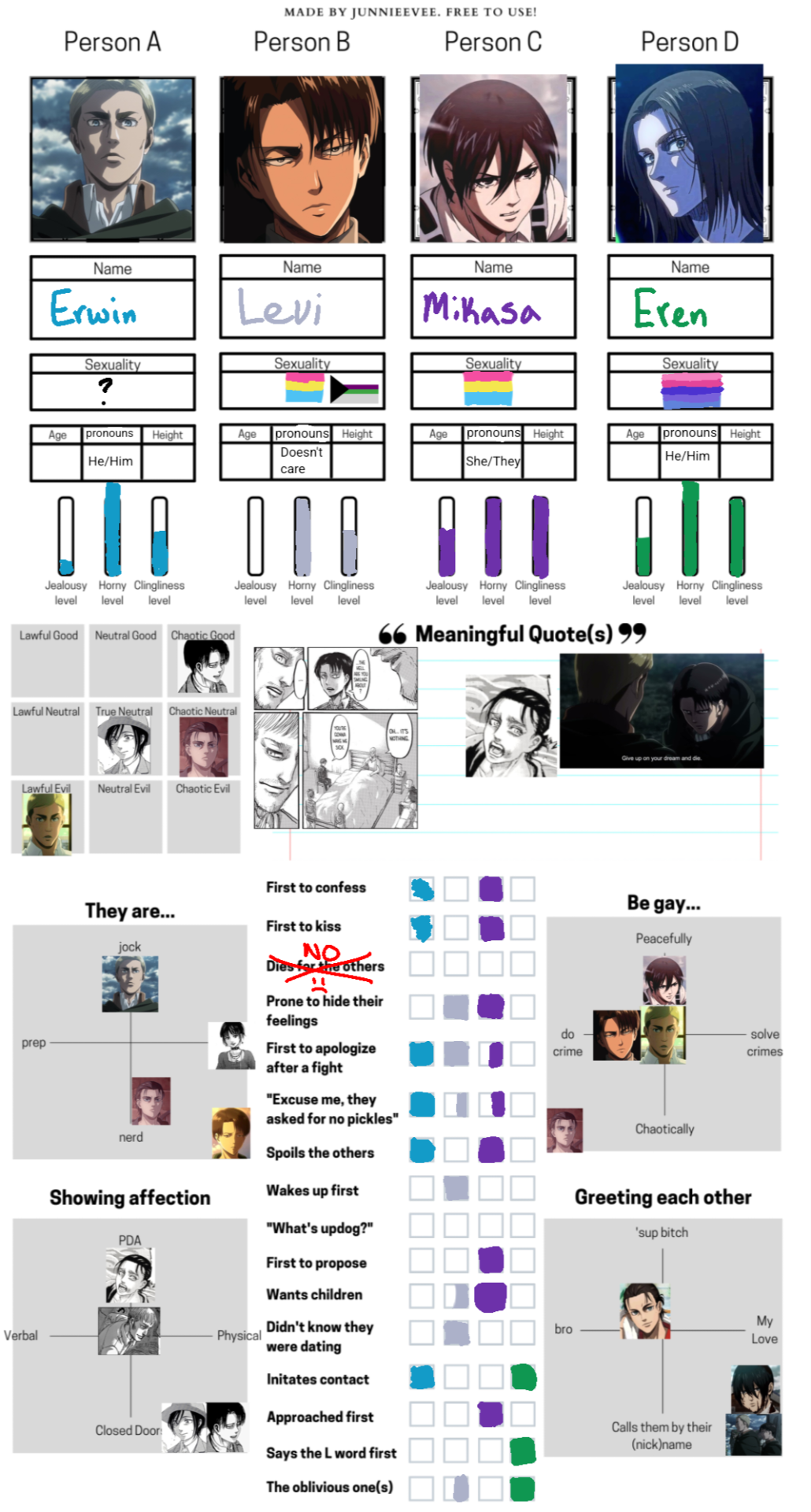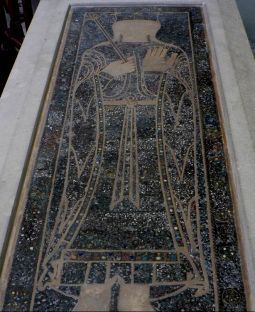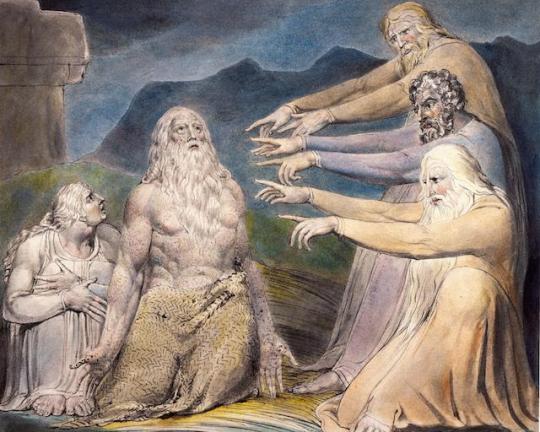#eruere
Explore tagged Tumblr posts
Text
I'm back with more headcanons for my favorite crack ship, Erumikariren. I need sleep so bad.


#no death talk only happy headcanons#eruri#ereri#eruere#erurivamika#erumika#rivamika#Erumikariren#i started this at 3am now its 8. im in pain
19 notes
·
View notes
Text
I made this with a website called "Picrew"

It's so adorable ❤️❤️❤️❤️
23 notes
·
View notes
Photo



Mermen! Eruriren
#Ereri#Eruri#Erwin Smith#Erwin#erwin x levi#erwin x rivaille#eren x levi#eren x rivaille#riren#rivaere#eruere#erwin x eren#mermen#Eren Jaeger#LEVI ACKERMAN#Levi Heichou#myart
20 notes
·
View notes
Photo

I would like to thank everyone who has helped support me over the past year with my writing blog! I first started thia blog as a means of creating stories, and now it has grown into something much more. It has started friendships, improved my writing and brought about a whole new era of my life :) So to celebrate, I'm taking requests! Either ships, headcanons you'd like to see a ficlet for, anything youd like no matter the fandom, ship, or request! NSFW are accepted and I'll be writing all of them in the next week ❤
#eruri#winmin#erejean#jearmin#mchanzo#jeanmarco#soumako#makosou#sourin#erumike#eruere#victuuri#victuri#otayuri#sheith#shlance#hance#kagehina#iwaoi#rusame#canukr#fruk#yumikuri#shallura#reibert#akihamu#akiham#persona 4#soyou#bokuaka
118 notes
·
View notes
Text
This is so fucking true
headcanon: everyone wants to fuck eren jeager. the end.
#eren jaeger#shingeki no kyojin#attack on titan#ereri#eruere#jeanere#eremin#erenmarco#marcoeren#eremika#mikaere#eruren
379 notes
·
View notes
Photo






MEROVINGIAN REGINAE | Fredegund Regina († 597)
Third principal wife of Chilperich I Rex, to whom she bore five sons, Chlodobert Rex, Samson Rex, Dagobert Rex, Theodorich Rex and Chlothacar II Rex, and one daughter, Rigund Regina. As Chilperich’s wife, she may have lived between several civitates, such as Rotomagus (Rouen), Parisius ( Paris), Sexonas (Soissons) or Brennacum (Berny).
According to Gregorius of Tours, she was already his favourite even before the wedding with Galswintha Regina in 567, and despite the fact he had to put aside his whole women and concubines for this wedding, including his first chief wife, Audovera Regina, he quickly took her back near him. Even if we do not know exactly when or why, it must have been because she bore him her first son Chlodobert Rex, much to the anger of Galswintha Regina, who felt outraged by her presence.
“[...] promittens per legatus se alias relicturum, tantum condignam sibi regisque prolem mereretur accipere. [...] Quae cum ad Chilpericum regem venisset, cum grande honore suscepta eiusque est sociata coniugio; a quo etiam magno amore diligebatur. Detulerat enim secum magnos thesauros. Sed per amorem Fredegundis, quam prius habuerat, ortum est inter eos grande scandalum.
He told the messengers to say that he promised to dismiss all the others, if only he were considered worthy of marrying a King’s daughter of a rank equal to his own. [...] When she reached the court of King Chilperic, he welcomed her with great honour and made her his wife. He loved her very dearly, for she had brought a large dowry with her. A great quarrel soon ensued between the two of them, however, because he also loved Fredegund, whom he had married before he married Galswinth.”
DLH, IV 28. De uxoribus Chilperici
After the death of Galswintha Regina in 568, she officially became Chilperich’s new chief wife and gave birth to all of his other children. Basing on the sources, he apparently remained faithful to her and did not take other significant concubine. Fredegund seemed to have been very popular and loved by the people, and was also known as being a good administrator and landowner, as she was able to raise money and numerous gifts for her daughter’s dowry.
“Sed et mater eius inmensum pondus auri argentique sive vestimentorum protulit, ita ut videns haec rex nihil sibi remansisse potaret. Quem cernens regina commotum, conversa ad Francus, ita ait: ‘Ne potitis, viri, quicquam hic de thesauris anteriorum regum habere; omnia enim quae cernetis de mea proprietate oblata sunt, quia mihi gloriosissimus rex multa largitus est, et ego nonnulla de proprio congregavi labore et de domibus mihi concessis tam de fructibus quam tributis plurima reparavi. Sed et vos plerumque me muneribus vestris ditastis, de quibus sunt ista quae nunc coram videtis; nam hic de thesauris publicis nihil habetur’.
Her. mother added a vast weight of gold and silver, and many fine clothes. When he saw this, King Chilperic thought that he had nothing left at all. Queen Fredegund realized that he was upset. She turned to the Franks and said: ‘Do not imagine, men, that any of this comes from the treasures amassed by your earlier kings. Everything you see belongs to me. Your most illustrious King has been very generous to me, and I have put aside quite a bit from my own resources, from the manors granted to me, and from revenues and taxes. You, too, have often given me gifts. From such sources come all the treasures which you see in front of you. None of it has been taken from the public treasury’.”
DLH, VI, 45. De nuptiis Rigunthae, filiae Chilperici
However she had to face the death of almost all her sons: Samson in 577, Chlodobert and Dagobert in 580 during the Plague of the Gauls, and then Theodorich in 584. The same year, her husband was brutally killed, leaving her alone with her last son, Chlothacar II Rex, who was barely 4 months, and her daughter Rigund Regina, at that time on the road to marry Reccared, heir of Toledo. She seized the royal treasure and took refuge in the Basilica Saint-Étienne de Paris, claiming the role of regent over the regnum Neustria, and placing herself under the protection of Guntchramn Rex and Bishop Ragnemod of Parisius.
“Interea Fredegundis regina iam viduata Parisius advenit et cum thesauris, quos infra murorum septa concluserat, ad aeclesiam confugit adque a Ragnemodo fovetur episcopo.
Meanwhile the widowed Queen Fredegund arrived in Paris. She took with her that part of her treasure which she had secreted within the city walls, and she sought sanctuary in the cathedral, where she was given protection by Bishop Ragnemod.”
DLH, VII, 4. Quod Fredegundis in aeclesia confugit
As Guntchramn was having doubts on the parentage of her baby, she summoned an assembly of 3 bishops and 300 nobiles who all attested of her honorability and officially named the baby Chlothacar.
“Interea Fredegundis regina iam viduata Parisius advenit et cum thesauris, quos infra murorum septa concluserat, ad aeclesiam confugit adque a Ragnemodo fovetur episcopo.
Meanwhile the widowed Queen Fredegund arrived in Paris. She took with her that part of her treasure which she had secreted within the city walls, and she sought sanctuary in the cathedral, where she was given protection by Bishop Ragnemod.”
DLH, VII, 4. Quod Fredegundis in aeclesia confugit
She also managed to save her daughter, who was taken as an hostage by Dux Desiderius after the new of her father’s death, and threaten to be taken in marriage by force by the pretender Gundovald.
“Fredegundis autem his diebus Chuppanem in Tholosano direxit, ut scilicet filiam suam exinde quocumque modo possit eruere. [...] acceptam Rigundem a loco illo reduxit, non sine grande humilitate adque contumilia.
At this time Fredegund sent Chuppa into the Toulouse area to bring home her daughter Rigunth by hook or by crook. [...] so he took Rigunth, humiliated and insulted as she was, and brought her home instead.”
DLH, VII, 39. Quod idem emisit qui Brunechildem lederet
Facing multiple oppositions because of her new position, she managed to secure herself with various allies among the nobiles and neutralized her major opponents, such as Bishop Praetextatus, who resented her for many years. As a regent, she was known as being fearless and cunning, rendering justice, and even challenging her brother-in-law Guntchramn on some matters, such as negociations with Hispania while he strictly forbidden it, or with Brittany in 586.
“Sed et Warocum nuntios dirigit, ut, qui adhuc captivi in Brittaniis de exercitu Gunthchramni regis retenebantur, pro huius vita absolverentur. Quod ita Warocus implevit.
[S]he sent messengers to Waroch, ordering him to set free the prisoners from King Guntram’s army whom he was still holding in Brittany. Waroch did as he was told.”
DLH, X, 11. De infirmitate Chlothari iunioris
Despite their mutual hostility, they pursued diplomatic relationship and she was regarded as the true leader of the west regnum during the whole minority of Chlothacar, even leading military expeditions with him. She was also a pious woman, who made several donations to churches and basilicas.
“Sed cum eum Fredegundis, mater eius, disperatum vidisset, multum pecuniae ad basilicam sancti Martini vovit, et sic puer melius agere visus est.
When Fredegund, the mother of Lothar, saw how desperately ill he was, she vowed that she would donate a great sum of money to the church of Saint Martin.”
DLH, X, 11. De infirmitate Chlothari iunioris
She eventually died of natural causes in 597, in Parisius and was buried near her husband into the Basilica Sainte-Croix-et-Saint-Vincent (actual abbey of St. Germain-des-Prés), in Parisius (Paris). Her grave, which had been identified thanks to a later tombstone, had been moved during the 19th century in the Basilica of St. Denis, where it is still nowadays.
“Anno secundo regni Teuderici Fredegundis moritur.
The second year of Theuderic’s reign, Fredegund dies.”
Chron, IV, 17. De Fredegunde, quod Parisius invasit, et pugna contra Teudeberto

Fredegund’s grave in St. Denis

Detail of the tombstone
#historyedit#perioddramaedit#women in history#merovingian queens#merovingian reginae meme#fredegund regina#6th century#my queen!!!!!#i love her as much as infinity!#next move i want to see her grave ;A;
158 notes
·
View notes
Text
Owan Rainstorm: Constituents hail Ihonvbere’s intervention back NASS Re-election
Owan Rainstorm: Constituents hail Ihonvbere’s intervention back NASS Re-election
9News Nigeria Kenneth Udeh Ahead of the 2023 general elections Residents of Eruere Community in Owan West Local Government Area of Edo State, have urged Political stakeholders, community, religious and Leaders in Owan Federal Constituency, to support the re-election bid of Prof. Ihonvbere for a second term to the National Assembly Citing his achievement in the areas of projects, empowers and…

View On WordPress
0 notes
Text

Haec dicit Dominus, Deus David patris tui: Audivi orationem tuam, et vidi lacrimas tuas . . .
Yesterday we learned that quia pulvis sumus et in pulverem reverterimus. So it really shouldn’t matter if you’re sick to the point of death (aegrotas usque ad mortem) or suffering from paralysis or pain (jaces paraclytus or male torqueris). But in both cases, there were healings -- and healings as the fruit of prayer.
New Vocabulary:
This time, I started with only ten. So I took off just one from the verbs and one from the nouns.
aegroto, aegrotare, aegrotavi, aegrotatum -- to be sick eruo, eruere, erui, erutum -- to cast out irrideo, irridere, irrisi, irrisum -- to jeer iaceo, iacere, iacui, iactum -- to lie prostrate or ill obsecro, obsecrare, obsecravi, obsecratum -- to implore torqueo, torquere, torsi, tortum -- to twist
iracundia, iracundiae -- hastiness to anger stridor, stridoris -- grating sound
The words that made it all have something to do with illness, pain, and suffering. I don’t know about you, but my vocabulary lists usually turn out to be as thematic as the texts I mine them from.
Other Notes:
There’s another future perfect active indicative here in “Exaudi, Deus, orationem meam, et ne despexeris deprecationem meam . . .” I still don’t understand why. I may e-mail my old Latin Master about this.
0 notes
Note
[text] offerre poterit eruere vos dura mea
From Rhea 🥰 [text] where are you, cor meum?
[text]: solet nubes amica.
[text]: vis festina ad me venire?
4 notes
·
View notes
Photo

BOOK OF JOB - From The Douay-Rheims Bible - Latin Vulgate
Chapter 10
The Book of Job shows how human affairs are ruled by Divine Providence using probable arguments.
"Although you hide these things in your heart, I know that you still remember everything." - (Job speaking to God)
***
INTRODUCTION.
This Book takes its name from the holy man, of whom it treats; who, according to the more probable opinion, was of the race of Esau, and the same as Jobab, king of Edom, mentioned Gen. xxxvi. 33. It is uncertain who was the writer of it. Some attribute it to Job himself; others to Moses, or some one of the prophets. In the Hebrew it is written in verse, from the beginning of the third chapter to the forty-second chapter. Ch. --- The beginning and conclusion are historical, and in prose. Some have divided this work into a kind of tragedy, the first act extending to C. xv., the second to C. xxii., the third to C. xxxviii., where God appears, and the plot is unfolded. They suppose that the sentiments of the speakers are expressed, though not their own words. This may be very probable: but the opinion of those who look upon the work as a mere allegory, must be rejected with horror. The sacred writers speak of Job as of a personage who had really existed, (C.) and set the most noble pattern of virtue, and particularly of patience. Tob. ii. 12. Ezec. xiv. 14. Jam. v. 11. Philo and Josephus pass over this history, as they do those of Tobias, Judith, &c. H. --- The time when Job lived is not clearly ascertained. Some have supposed (C.) that he was a contemporary with Esther; (D. Thalmud) on which supposition, the work is here placed in its chronological order. But Job more probably live during the period when the Hebrews groaned under the Egyptian bondage, (H.) or sojourned in the wilderness. Num. xiv. 9. The Syrians place the book at the head of the Scriptures. C. --- Its situation has often varied, and is of no great importance. The subject which is here treated, is of far more; as it is intended to shew that the wicked sometimes prosper, while the good are afflicted. H. --- This had seldom been witnessed before the days of Abraham: but as God had now selected his family to be witnesses and guardians of religion, a new order of things was beginning to appear. This greatly perplexed Job himself; who, therefore, confesses that he had not sufficiently understood the ways of God, till he had deigned to explain them in the parable of the two great beasts. C. xlii. 3. We cannot condemn the sentiments expressed by Job, since God has declared that they were right, (ib. v. 8) and reprimands Elihu, (C. xxxviii. 2.) and the other three friends of Job, for maintaining a false opinion, though, from the history of past times, they had judge it to be true. This remark may excupate them from the stain of wilful lying, and vain declamation. Houbigant. --- However, as they assert what was false, their words of themselves are of no authority; and they are even considered as the forerunners of heretics. S. Greg. S. Aug. &c. T. --- Job refutes them by sound logic. S. Jerom. --- We may discover in this book the sum of Christian morality, (W.) for which purpose it has been chiefly explained by S. Gregory. The style is very poetical, (H.) though at the same time simple, like that of Moses. D. --- It is interspersed with many Arabic and Chaldaic idioms; (S. Jer.) whence some have concluded, that it was written originally by Job and his friends (H.) in Arabic, and translated into Heb. by Moses, for the consolation of his brethren. W. --- The Heb. text is in many places incorrect; (Houbig.) and the Sept. seem to have omitted several verses. Orig. --- S. Jerom says almost eight hundred, (C.) each consisting of about six words. H. --- Shultens, in 1747, expressed his dissatisfaction with the labours of all preceding commentators. To explain this book may not therefore be an easy task: but we must be as short as possible. H. --- Those who desire farther information, may consult Pineda, (W.) whose voluminous work, in two folios, will nearly (H.) give all necessary information. C.
The additional Notes in this Edition of the New Testament will be marked with the letter A. Such as are taken from various Interpreters and Commentators, will be marked as in the Old Testament. B. Bristow, C. Calmet, Ch. Challoner, D. Du Hamel, E. Estius, J. Jansenius, M. Menochius, Po. Polus, P. Pastorini, T. Tirinus, V. Bible de Vence, W. Worthington, Wi. Witham. — The names of other authors, who may be occasionally consulted, will be given at full length.
Verses are in English and Latin.
HAYDOCK CATHOLIC BIBLE COMMENTARY
This Catholic commentary on the Old Testament, following the Douay-Rheims Bible text, was originally compiled by Catholic priest and biblical scholar Rev. George Leo Haydock (1774-1849). This transcription is based on Haydock's notes as they appear in the 1859 edition of Haydock's Catholic Family Bible and Commentary printed by Edward Dunigan and Brother, New York, New York.
TRANSCRIBER'S NOTES
Changes made to the original text for this transcription include the following:
Greek letters. The original text sometimes includes Greek expressions spelled out in Greek letters. In this transcription, those expressions have been transliterated from Greek letters to English letters, put in italics, and underlined. The following substitution scheme has been used: A for Alpha; B for Beta; G for Gamma; D for Delta; E for Epsilon; Z for Zeta; E for Eta; Th for Theta; I for Iota; K for Kappa; L for Lamda; M for Mu; N for Nu; X for Xi; O for Omicron; P for Pi; R for Rho; S for Sigma; T for Tau; U for Upsilon; Ph for Phi; Ch for Chi; Ps for Psi; O for Omega. For example, where the name, Jesus, is spelled out in the original text in Greek letters, Iota-eta-sigma-omicron-upsilon-sigma, it is transliterated in this transcription as, Iesous. Greek diacritical marks have not been represented in this transcription.
Footnotes. The original text indicates footnotes with special characters, including the astrisk (*) and printers' marks, such as the dagger mark, the double dagger mark, the section mark, the parallels mark, and the paragraph mark. In this transcription all these special characters have been replaced by numbers in square brackets, such as [1], [2], [3], etc.
Accent marks. The original text contains some English letters represented with accent marks. In this transcription, those letters have been rendered in this transcription without their accent marks.
Other special characters.
Solid horizontal lines of various lengths that appear in the original text have been represented as a series of consecutive hyphens of approximately the same length, such as ---.
Ligatures, single characters containing two letters united, in the original text in some Latin expressions have been represented in this transcription as separate letters. The ligature formed by uniting A and E is represented as Ae, that of a and e as ae, that of O and E as Oe, and that of o and e as oe.
Monetary sums in the original text represented with a preceding British pound sterling symbol (a stylized L, transected by a short horizontal line) are represented in this transcription with a following pound symbol, l.
The half symbol (1/2) and three-quarters symbol (3/4) in the original text have been represented in this transcription with their decimal equivalent, (.5) and (.75) respectively.
Unreadable text. Places where the transcriber's copy of the original text is unreadable have been indicated in this transcription by an empty set of square brackets, [].
Chapter 10
Job lements his afflictions and begs to be delivered.
[1] My soul is weary of my life, I will let go my speech against myself, I will speak in the bitterness of my soul.
Taedet animam meam vitae meae; dimittam adversum me eloquium meum, loquar in amaritudine animae meae.
[2] I will say to God: Do not condemn me: tell me why thou judgest me so.
Dicam Deo : Noli me condemnare; indica mihi cur me ita judices.
[3] Doth it seem good to thee that thou shouldst calumniate me, and oppress me, the work of thy own hands, and help the counsel of the wicked?
Numquid bonum tibi videtur, si calumnieris me, et opprimas me opus manuum tuarum, et consilium impiorum adjuves?
[4] Hast thou eyes of flesh: or, shalt thou see as man seeth?
Numquid oculi carnei tibi sunt? aut sicut videt homo, et tu videbis?
[5] Are thy days as the days of man, and are thy years as the times of men:
Numquid sicut dies hominis dies tui, et anni tui sicut humana sunt tempora,
[6] That thou shouldst inquire after my iniquity, and search after my sin?
ut quaeras iniquitatem meam, et peccatum meum scruteris,
[7] And shouldst know that I have done no wicked thing, whereas there is no man that can deliver out of thy hand.
et scias quia nihil impium fecerim, cum sit nemo qui de manu tua possit eruere?
[8] Thy hands have made me, and fashioned me wholly round about, and dost thou thus cast me down headlong on a sudden?
Manus tuae fecerunt me, et plasmaverunt me totum in circuitu; et sic repente praecipitas me?
[9] Remember, I beseech thee, that thou hast made me as the clay, and thou wilt bring me into dust again.
Memento, quaeso, quod sicut lutum feceris me, et in pulverem reduces me.
[10] Hast thou not milked me as milk, and curdled me like cheese?
Nonne sicut lac mulsisti me, et sicut caseum me coagulasti?
[11] Thou hast clothed me with skin and flesh: thou hast put me together with bones and sinews:
Pelle et carnibus vestisti me; ossibus et nervis compegisti me.
[12] Thou hast granted me life and mercy, and thy visitation hath preserved my spirit.
Vitam et misericordiam tribuisti mihi, et visitatio tua custodivit spiritum meum.
[13] Although thou conceal these things in thy heart, yet I know that thou rememberest all things.
Licet haec celes in corde tuo, tamen scio quia universorum memineris.
[14] If I have sinned and thou hast spared me for an hour: why dost thou not suffer me to be clean from my iniquity?
Si peccavi, et ad horam pepercisti mihi, cur ab iniquitate mea mundum me esse non pateris?
[15] And if I be wicked, woe unto me: and if just, I shall not lift up my head, being filled with affliction and misery.
Et si impius fuero, vae mihi est; et si justus, non levabo caput, saturatus afflictione et miseria.
[16] And for pride thou wilt take me as a lioness, and returning thou tormentest me wonderfully.
Et propter superbiam quasi leaenam capies me, reversusque mirabiliter me crucias.
[17] Thou renewest thy witnesses against me, and multipliest thy wrath upon me, and pains war against me.
Instauras testes tuos contra me, et multiplicas iram tuam adversum me, et poenae militant in me.
[18] Why didst thou bring me forth out of the womb: O that I had been consumed that eye might not see me!
Quare de vulva eduxisti me? qui utinam consumptus essem, ne oculus me videret!
[19] I should have been as if I had not been, carried from the womb to the grave.
Fuissem quasi non essem, de utero translatus ad tumulum.
[20] Shall not the fewness of my days be ended shortly? suffer me, therefore, that I may lament my sorrow a little:
Numquid non paucitas dierum meorum finietur brevi? Dimitte ergo me, ut plangam paululum dolorem meum;
[21] Before I go, and return no more, to a land that is dark and covered with the mist of death:
antequam vadam, et non revertar, ad terram tenebrosam, et opertam mortis caligine :
[22] A land of misery and darkness, where the shadow of death, and no order, but everlasting horror dwelleth.
terram miseriae et tenebrarum, ubi umbra mortis et nullus ordo : sed sempiternus horror inhabitat.
Commentary:
Ver. 1. Life. Job had intimated a fear to proceed any farther. C. --- But perceiving that he had not convinced his friends, he continues his discourse (H.) in still stronger terms, yet so as to acknowledge the justice of God. C. --- Speech against. Heb. "complaint upon, (H.) or respecting myself," I will deplore my misfortunes, (C.) or I will say no more about them. M.
Ver. 2. Judgest. Heb. "contendest with me," as with an enemy? Is it to punish some fault, or only to make thy grace shine forth? C.
Ver. 3. Calumniate permissively, by treating me in such a manner, that others lay false crimes to my charge. Heb. "oppress and despise the work." --- Wicked, who are ready enough (H.) to assert that virtue is useless, (C.) and that God mindeth not human affairs. My affliction will confirm them in their false notion, (H.) and my friends will triumph as if their arguments were well founded. The devil will also exult. C. --- He knew that God could not be guilty of calumny, and inquireth why he is afflicted. W.
Ver. 4. Seeth, judging only of the exterior. T. v. 6.
Ver. 5. Days, sometimes denote judgments. 1 Cor. iv. 3. Is God liable to change, like men, or does he stand in need of time to examine them, or fear lest they should escape? C. --- Is it necessary for him to prove his friends, to know their real dispositions? Sanctius.
Ver. 7. Shouldst. Heb. and Sept. "Thou knowest that...and there," &c. H. --- It would be vain for me to appeal to any other. C.
Ver. 8. Sudden, like a potter's vessel? Job was reduced to misery all at once. C. --- He acknowledges that God may destroy him as his creature; but that character encourages him to hope for mercy, grace, and glory. W.
Ver. 10. Milked. Heb. "poured me out as milk, and curdled me like cheese?" H. --- See Wisd. vii. 1. The ancients explained our origin by the comparison of milk curdled, or cheese; (Arist. i. 10. Pliny vii. 15.) which the moderns have explained on more plausible principles. C. --- Yet still we may acknowledge our ignorance with the mother of Machabees. 2 Mac. vii. 22.
Ver. 12. Thy fatherly visitation (H.) but still preserved my life. C.
Ver. 13. Rememberest. Sept. "canst do all things." Heb. "this is with thee." H. --- I am convinced that thou still regardest me with affection, though it would appear as if thou hadst forgotten me. C.
Ver. 14. Iniquity? Punishing me for the sins which seemed to be pardoned. C. --- Heb. "If I sin, then thou makest me, and wilt not suffer; (H.) or if thou hast not pardoned my iniquity: (15) And," &c. C.
Ver. 15. Woe. Thou wilt not suffer me to pass unpunished. C. --- Head. I will adore in silence. C. ix. 15. 31. Ven. Bede. C.
Ver. 16. Pride. If I give way to pride, thou wilt pull me down, though I were as fierce and strong as a lioness. Heb. "for it (affliction) increaseth. Thou huntest me." Prot. --- Returning. Heb. and Sept. "again." H.
Ver. 17. Witnesses, afflictions; (M.) "wounds." Pagnin. T.
Ver. 20. Lament. Heb. "take comfort," (H.) or breath. C. --- Repentance is always necessary, but more particularly at the hour of death. W.
Ver. 21. Death, to the grave, or to hell, (C.) if my sins deserve it. H.
Ver. 22. Horror. At death all distinction of ranks is at an end. T. - Heb. "where the light is as darkness." Prot. Sept. "To the land of eternal darkness, where there is no sound, nor life of mortals to see." H.
0 notes
Photo

been a little busy with a fun summer so far, but i managed to cough up some eruren!
(and wow, i missed eruriren week? oh snap. definitely gotta compensate for that soon.)
#eruren#eruere#eren jaeger#erwin smith#snk#i graduated!#and am currently on a long vacay in hawaii#i haven't fallen off the face of the planet#just been a bit busy#:)#my art
214 notes
·
View notes
Photo





Erwin X Eren is literally the cutest thing kill me.
34 notes
·
View notes
Photo

20-12-15
#eruren#eruere#erwin x eren#snk#aot#shingeki no kyojin#attack on titan#this shit took for ever#my art#I like how it turned out though
183 notes
·
View notes